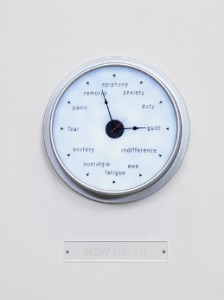
Raqs Media Collective, Escapement, 2009 (Detail). 27 clocks, high glass aluminium with LED lights, four flat screen monitors, video and audio looped. Dimensions variable. (Courtesy The Clark)
(WILLIAMSTOWN, Mass.) – Noted U.S. and international scholars will gather at The Clark on November 4 and 5 for the 2011 Clark Conference, In the Wake of the Global Turn: Propositions for an “Exploded” Art History without Borders. This scholarly conference draws together scholars to investigate what a shift towards a broader geographical expanse in art historical inquiry has meant – and could mean – for the discipline of art history.
In the Wake of the Global Turn will explore questions such as: How must the discipline of art history change, what are the assumptions it must relinquish, and what ideas must it embrace in order to effect a true dislocation of “center-periphery” models of cultural intellectual exchange? How might an emphasis on interregional collaboration take the place of an emphasis on monolithic concepts such as the nation-state or “the global”? How might a radically de-centered art history differ from one re-centered around a different origin (Africa vs. Europe, for example)? How must a “global art history” address not simply the geographical range, but an entire re-conception of art history’s objects, methods, and goals? How might the focus on regional interactions aid or detract from such objectives?
In the Wake of the Global Turn: Propositions for an “Exploded” Art History without Borders will be convened by Jill Casid, associate professor of art history at the University of Wisconsin-Madison, and Aruna D’Souza, associate director of the Clark’s Research and Academic Program. Michael Ann Holly, Starr director of the Clark’s Research and Academic Program, will open the conference.
“We are delighted to be hosting In the Wake of the Global Turn,” said Holly, “which brings together so many well-known as well as new voices to talk about the ways the discipline of art history is itself a global one. This is an especially important conversation to have at the Clark because of its abiding international engagements, with its Mellon-sponsored research initiatives in Africa, East-Central Europe, and in the coming years in the Indian Ocean region, as well as with its past conferences. In the Wake of the Global Turn will, we hope, push us always to ask new questions.”
Renowned speakers will explore these issues through a wide range of lectures, including:
Renata Camargo Sá, Universidade Federal Fluminense: “For a Hermeneutics of the Impure—Art and Truth in an Age of Contamination”
Kobena Mercer, Yale University: “Contraflow: Mapping Networks in Cross-Cultural Modernity”
Isabel Seliger, independent scholar, Berlin: “Crosscultural, Interpictorial, and Transgender: The Convergence of Male Icons in the Gandharan Visual Field”
Kerstin Schankweiler, Freie University Berlin: “Writing Art History Transculturally: A Postcolonial Reading of George Kubler’s The Shape of Time”
Raqs Media Collective (Monica Narula, Jeebesh Bagchi, and Shuddhabrata Sengupta), Delhi: “An Ephemeris, Corrected for the Longitudes of Tomorrow: Speculations on Orbits and Motions, Objects and Processes in Contemporary Art”
Kishwar Rizvi, Yale University: “Transnational Islam, or the Reification of History through Contemporary Architecture”
Alessandra Russo, Columbia University: “De tlacuilolli: Renaissance Artistic Theory in the Wake of the Global Turn”
Talinn Grigor, Brandeis University: “Neither Orient, nor Rome: Art History’s Global Turn in 1901”
David Roxburgh, Harvard University: “Troubles with Perspective: Case Studies in Picture-Making from Qajar Iran in the 1800s”
Todd Porterfield, Université de Montréal: “Transversal Positioning Practices”
Nicholas Mirzoeff, New York University: “Inside Out: The History of the Anonymous in the Crisis of Visuality”
Ranjana Khanna, Duke University: “Technologies of Un-Belonging”
Each session will be followed by discussion.
Tickets are $30 ($20 for members and students). For more information and tickets, please visit The Clark or call 413.458.0469. Admission is free for Williams College faculty and students.
The Clark is one of the country’s foremost art museums and a dynamic center for research and higher education in art history and criticism. It is one of only a few art museums in the U.S. that is also a major research and academic center, with an international fellowship program and regular conferences, symposia, and colloquia, as well as an important art research library. The Clark, together with Williams College, jointly sponsors one of the nation’s leading M.A. programs in art history.
The Clark is located at 225 South Street in Williamstown, MA. The galleries are open Tuesday through Sunday, 10 am to 5 pm (open daily in July and August). Admission is free November through May. Admission June 1 through October 31 is $15 for adults, free for children 18 and under, members, and students with valid ID. For more information, call 413-458-2303 or visit The Clark.
